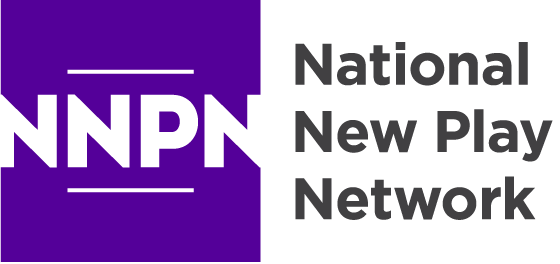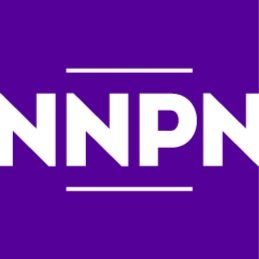Could playwrights play a role in bridging the growing divides in our country?
Twenty-three years ago, I got a call from someone I’d never heard of named David Goldman. He had a big idea he wanted to discuss with me about finding a way for new plays to find productions across the country without having to make it to Broadway and/or receive a rave in the New York Times. He wondered if my ten-year-old theatre in Philly, InterAct Theatre Company, might be interested in joining forces with other like-minded, new play-oriented theatres to form a network that could serve as an alternative to the Broadway-or-bust model. That big idea obviously worked.
Some of NNPN's Founders together in Minneapolis, including Seth & David center.
Twenty years later, in 2018, I got a call from my now-friend and colleague David Goldman saying he had another big idea he wanted to discuss. Concerned about longstanding cultural divisions that were rapidly widening and intensifying under then-President Trump’s “zero-sum/scorched earth” leadership style, David asked me if I thought playwrights and new plays could play a role in bridging these growing divides. As someone who is always grappling with questions about the value, purpose, and impact of what we do as new text-based theatre makers, I was immediately hooked… again.
We brought together a group of six new play leaders and lovers who share a collective desire to grapple with this question in something akin to a think tank, called Our Towns. In addition to myself and David (who now serves as Director of the National Center for New Plays at Stanford University), the group includes Elaine Romero (Associate Professor of Playwriting at the University of Arizona in Tucson), Kristen Vehill (Board member for NNPN, 16th Street Theatre, Prop Thtr in Chicago), John Clinton Eisner (Founder and former Artistic Director of Lark Play Development Center in New York), and Michael Fried (Co-Founder and Artistic Producer of Planet Earth Arts in Berkeley).
Early on, we posed the question above to NNPN Affiliated Artists. We received 29 diverse, passionate, and constructive responses that led to insights that helped us along on our journey, and finally arrived at the following mission:
Our Towns seeks to foster empathy over othering by activating theatre as a tool to engage communities nationwide in real-time personal interactions, creative explorations of our own and other people’s stories, and in civil, civic discourse around our shared humanity.
What distinguishes Our Towns from the many other noteworthy theatre-based community outreach initiatives across the country are three key factors:
We are driven by the singular goal of promoting empathy;
We seek to engage local communities in communal reflection on their stories and issues; and
We are committed to facilitating an “exchange of humanity” on a national scale, connecting every local community we work with into a vast, broad, and diverse network of empathic Americans.
As it happens, the work of Our Towns intersects with and will be informed by a newly published paper in the Journal of Experimental Social Psychology – Attending Live Theatre Improves Empathy, Changes Attitudes, and Leads to Pro-Social Behavior – which offers this scholarly affirmation of something we in the theatre industry take for granted: “After, as compared to before, seeing the plays, people reported greater empathy for groups depicted in the shows, held opinions that were more consistent with socio-political issues highlighted in the shows, and donated more money to charities related to the shows. Seeing theatre also led participants to donate more to charities unrelated to the shows, suggesting that theatre’s effects on pro-sociality generalize to different contexts. Altogether, these findings suggest that theatre is more than mere entertainment; it can lead to tangible increases in empathy and pro-social behavior.”
In the coming year, Our Towns will launch a pilot project to test its central premise. Our plan is to activate playwrights as leaders who will anchor the artistic outreach in distinct communities with which they have a literal and/or spiritual connection, and which represent dissimilar challenges and circumstances. We expect one of these communities to be somewhat homogenous and possibly isolated from a major cultural/cosmopolitan center. The other target communities will either be defined by a fractious divide among two (or more) distinct populations or ones that are a sub-community within a diverse urban center that is typically overlooked and/or misunderstood.
Our Towns will work with playwrights to identify a community liaison – possibly a community or cultural leader, clergy person, or educator in each locale – who will be engaged to help plan and facilitate a series of convenings of the same group of 10-12 local residents. Our Towns will engage the nearest NNPN Core or Associate Member theatres to help identify two regionally based actors.
We envision the pilot unfolding in four phases, as follows:
Story Sharing
A first convening at which local residents participate in story sharing inspired by processes introduced by John O’Neal and the Free Southern Theater in the early 1960s. Prompts may include questions such as: Do you ever feel misunderstood by someone inside or outside your community? What do you wish people would better understand about you?
Having closely observed participants’ stories, personalities, points of view, hopes, fears, dreams, grievances, etc. playwrights will then capture, re-frame and/or artfully dramatize as many of the stories as possible into monologues between 2-10 minutes in length.
Actors will offer dramatic readings of the captured stories at a second convening with the same local residents, engaging them in a new set of questions: How does it feel to hear your story? What did the playwright and actors get right about your story? What did they miss? What needs further clarification or exploration? How would you feel about your story being presented to people in a different community in another part of the country? How would you feel about seeing presentations of stories from people in other communities?
Playwrights will then revise the story-monologues in response to the feedback offered in the previous convening.
A separate team of playwrights and actors will then conduct these same activities in a decidedly different community in another part of the country.
Story Exchange
Following the completion of these first visits, each team of playwrights and actors will visit the other community and present/perform the stories they captured from the first community, followed by a discussion with such questions as: What most surprised you in hearing the other community’s stories? Did you find any commonalities? How does it now feel knowing your stories are being performed/presented for the other community?
Virtual Convening
Sometime after these second visits, Our Towns will lead a virtual convening at which all participants will have the opportunity to meet and share their responses to each other’s stories, asking questions like: Did you learn anything about yourself, your community, someone else and/or their community? Did anything you see make you want to learn more about a person or their community? How would you feel about this cohort expanding across the country?
Virtual Database of American Stories
Once final edits to all of the monologues have been completed by the playwrights, the actors will make video recordings of each and these files will be uploaded to a virtual database, which will remain accessible to all participants.
Our goal with this pilot program is to test this concept of fostering empathy through the sharing of dramatized stories within and across communities. We expect to learn whether our theory of change is sound, what can be improved in our artistic and community engagement processes, and what will maximize engagement of future participants and communities. Our hope is that if this initiative proves successful, we will set into motion an ever-growing network of individuals and communities, bound through empathy derived from the sharing of their stories.

